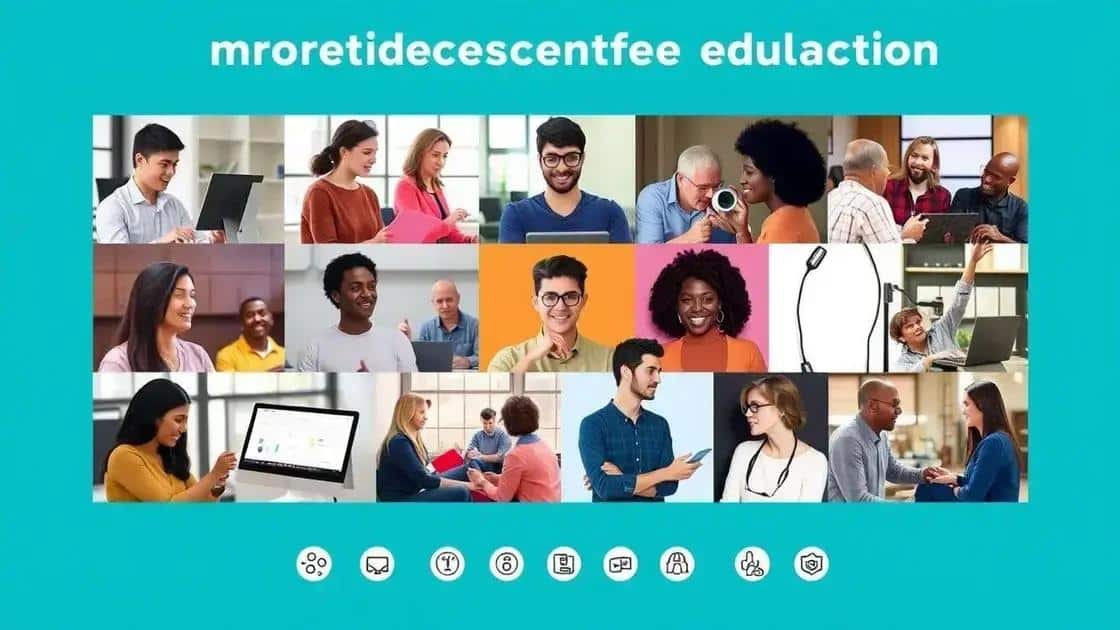Insights on microcredential education paths: How to navigate

Microcredential education paths offer targeted skills training quickly and cost-effectively, enhancing career prospects and demonstrating industry-relevant expertise to employers.
Insights on microcredential education paths can truly open doors for your career. Have you ever wondered how targeted learning could enhance your skill set? Let’s dive into this fascinating topic.
Understanding microcredentials and their importance
Understanding microcredentials is crucial in today’s fast-paced job market. As industries evolve, traditional degrees often don’t fully reflect the skills needed. Microcredentials offer a solution by focusing on specific competencies.
These short, focused credentials allow learners to gain targeted skills quickly. With their growing popularity, many people are turning to microcredentials to stay competitive and enhance their career prospects.
What are microcredentials?
Microcredentials are short, specialized courses that confer a certification upon completion. They can be obtained through online platforms, schools, or professional organizations. This flexibility makes them accessible to a wider audience.
Importance of microcredentials
The significance of microcredentials lies in their ability to bridge skill gaps. Companies often look for specific qualifications, and microcredentials can showcase a candidate’s expertise.
- They demonstrate a commitment to ongoing learning.
- Microcredentials can enhance resumes and portfolios.
- They’re often aligned with industry standards.
- They provide opportunities for networking and mentorship.
By understanding the value of microcredentials, you can make informed decisions about your education and career path. These credentials not only reflect your skills but also show your adaptability in an ever-changing job market. Embracing microcredentials might just be the key to unlocking new opportunities.
Benefits of pursuing microcredential education

Pursuing microcredential education offers numerous advantages in today’s competitive job market. With the rapid evolution of technology and skills requirements, embracing this form of education can set individuals apart.
One significant benefit is the speed of learning. Microcredential programs are designed to be completed in shorter timeframes compared to traditional degrees. This allows learners to gain relevant skills quickly, which is essential in fast-changing industries.
Cost-effective learning
Another advantage is the cost-effectiveness of microcredentials. Many programs are less expensive than full degree courses, making education more accessible to a wider range of individuals. This affordability helps learners avoid burdensome student debt while still achieving their educational goals.
Relevance to industry
Microcredentials are often created in collaboration with industry experts, ensuring that the skills taught are relevant and up-to-date. This alignment with current job market demands allows learners to be more competitive when applying for positions.
- Microcredentials can quickly fill specific skill gaps.
- They enhance your resume by showcasing targeted expertise.
- Employers often recognize and value these credentials.
- They promote lifelong learning and professional development.
Additionally, many microcredential programs offer flexible learning options, allowing learners to fit education into their busy schedules. As online learning grows, this flexibility no longer limits access to quality education. By pursuing microcredentials, individuals position themselves for success in various fields.
How to choose the right microcredential program
Choosing the right microcredential program can be quite challenging, but understanding a few key factors can help simplify the process. It’s crucial to find a program that aligns with your career goals and personal interests.
Start by identifying the skills you want to develop. Are you looking for technical skills, management expertise, or something else? Knowing your objectives will guide your research effectively.
Research available programs
Once you know your goals, it’s time to explore various programs. Look for accredited institutions or platforms known for quality. Reviews and testimonials can also provide valuable insights into the experiences of past students.
Consider the curriculum and format
Examine the curriculum of each program. Ensure it covers the topics that interest you. Additionally, consider the format—some people prefer online classes, while others thrive in face-to-face learning environments.
- Check for industry relevance in the curriculum.
- Consider the duration and pace of the courses.
- Look for opportunities for hands-on experience.
- Investigate networking opportunities with industry professionals.
Moreover, explore the support services available. Mentorship, career services, and networking can significantly enhance your learning experience and future job prospects. By comparing these aspects across several programs, you can make a well-informed decision that will benefit your career.
Real-life success stories with microcredentials

Real-life success stories featuring microcredentials illustrate the powerful impact these programs can have on individuals’ careers. These stories highlight how microcredentials can lead to new opportunities and advancements in various fields.
Many professionals have transformed their careers by completing short courses that focus on specific skills. For instance, a marketing specialist might take a microcredential in social media analytics, enabling them to secure a pivotal role at a digital marketing firm.
Career advancement examples
Numerous individuals have shared how obtaining microcredentials has propelled them into leadership positions. These credentials not only enhance their resumes but also equip them with the tools needed for management roles.
Industry recognition
Employers often recognize the value of microcredentials. For many hiring managers, such credentials signal a candidate’s commitment to continuous learning and skill development. It’s common for candidates to differentiate themselves with these achievements in applications.
- A software developer improved their job prospects by earning a microcredential in cloud computing.
- A teacher transitioned to an education technology role after completing a microcredential program.
- Healthcare professionals have gained specialization through microcredentials in areas like telehealth.
- Entrepreneurs have used microcredentials to refine business strategies, resulting in impressive growth.
These success stories serve as inspiration for anyone considering the pursuit of microcredentials. They demonstrate that with determination and targeted education, it is possible to enhance skills and achieve meaningful career growth.
FAQ – Frequently Asked Questions about Microcredential Education
What are microcredentials?
Microcredentials are short, specialized courses that offer certification upon completion, focused on specific skills.
How can microcredentials help my career?
They can enhance your resume, demonstrate specific skills to employers, and provide opportunities for career advancement.
Are microcredential programs cost-effective?
Yes, they are often less expensive than traditional degree programs, making quality education more accessible.
How do I choose the right microcredential program?
Identify your learning goals, research programs, check their curriculum, and consider the flexibility and support offered.






